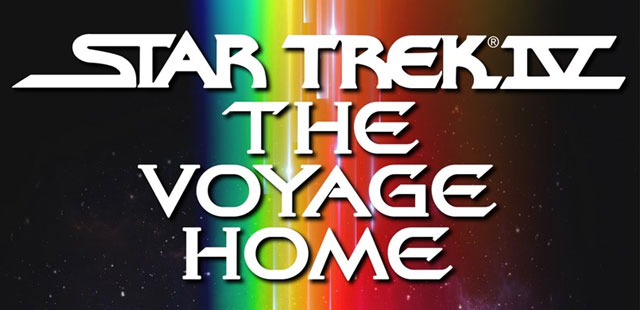
Palmer’s Trek, the unwatched frontier. These are the voyages of Agent Palmer. On his continuing mission: to explore Star Trek. To seek out its numerous series and movies. To boldly go where many fans have gone before!
The Voyage Home is the end of what Trek fans before me will know as the Genesis trilogy. Starting with The Wrath of Khan and continuing with The Search for Spock, this is another direct sequel, so there’s a lot of similarities to continue what I enjoyed about The Search for Spock.
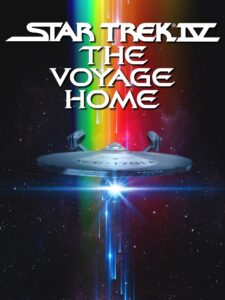
This is absolutely another delightful film in the franchise, because it returns to what it does best with the feeling and warmth of the television series. The time travel episodes of the Original Series – Naked Time, Tomorrow is Yesterday, The City on the Edge of Forever, and Assignment Earth – are some of the best of that series.
All of the travel is relative to the episode, but the time travel in this film is not unfamiliar to fans. It’s also not completely removed from the time travel Carl Sagan would have discussed in Cosmos, which would have aired in 1980.
Why time travel? Because humpback whales are required to save planet Earth, and they’ve been extinct since our time. Why whales? As Spock says, “There are other forms of intelligence on Earth, Doctor. Only human arrogance would assume the message must be meant for man.”
The underlying concept of a respect for nature, specifically a political message from a Star Trek film about the whaling industry, isn’t’ new to the franchise, but it is new to the big screen. And it’s handled largely the same way political messages were in the core concept of the television series. Not overtly, and not with a heavy hand. With few exceptions, Star Trek may be the most soft-handed political franchise of all time.
What’s not soft-handed is the culture shock of our crew, the loveable cast of characters that make the journey to present Earth. Sure there’s some fun with language and profanity, money, and transport, but when it comes to truly understanding how backwards we were, look no further than the state of our medicine and Dr. McCoy’s visit to a San Francisco hospital.
Before we get to McCoy’s thoughts it’s time to get to the time-tested trope of splitting up the party. Because it wouldn’t be nearly as interesting or fun if everyone stays together.
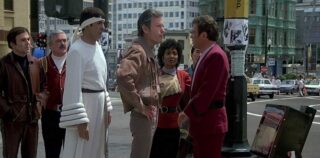
When everyone returns but Chekov, since the crew has either the materials or the information they need, they go to a hospital where McCoy speaks to our level of medical proficiencies in 1986.
“Dialysis? My god, what is this, the Dark Ages?”
“It sounds like the goddamn Spanish Inquisition”
“My God, man, drilling holes in his head’s not the answer. The artery must be repaired. Now put away your butcher knives and let me save this patient before it’s too late!”
“We’re dealing with medievalism here! …Chemotherapy! …Fundoscopic examinations!”
So we started out on Vulcan, with Spock starting to return to form academically, though not emotionally. On attempting to go to Earth to be judged for their insubordinations during Star Trek III: The Search for Spock, a probe looking for whales decimates the communications and life support systems of anything in its path in orbit or on planet.
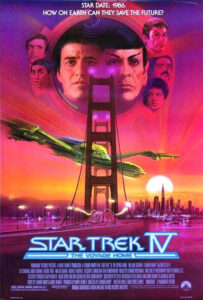
The only one that sticks is the only one that matters, Admiral Kirk gets the demotion he always wanted back to Captain, and in the final scenes of the film we see the crew heading to their new ship, the U.S.S. Enterprise. This time it’s the NCC-1701-A instead of the NCC-1701.
A small distinction, sure, but if you want to believe that the Voyage Home was about Spock returning fully to his half-Vulcan half-human self, that happened. If you want to believe it’s about all of the Earthlings returning to a past Earth to save it, that’s there for you. So, too, is the idea that the Voyage home is about getting back to your own time period.
But we all know it’s really about the Voyage back to Enterprise. This makes the absence of any “adventure continues” type of message at the end of the film a bit conspicuous.
I enjoyed this “Leonard Nimoy film,” the first film he’s directed to get such a distinction. In Nimoy’s hands it feels like the cinematic franchise is returning to what made the original series so fun.
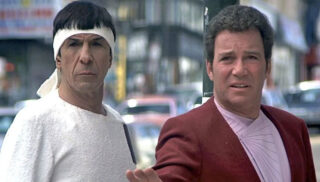 Leonard Rosenman steps in and does an admirable job with the score. That’s high praise considering that James Horner not only set the bar extremely high, he set a precedent with the previous two films that meant Rosenman couldn’t just decide to go another direction. Rosenman’s score fits and though it’s not my favorite, it really couldn’t have been an easy situation.
Leonard Rosenman steps in and does an admirable job with the score. That’s high praise considering that James Horner not only set the bar extremely high, he set a precedent with the previous two films that meant Rosenman couldn’t just decide to go another direction. Rosenman’s score fits and though it’s not my favorite, it really couldn’t have been an easy situation.
For me, this film is right up there with the Star Trek II: The Wrath of Khan, though Search for Spock remains my favorite up to this point. Voyage Home has two very specific moments that I believe encapsulate Star Trek as a franchise and a show.
First is McCoy’s attempt to talk to Spock about the ordeal of the entire previous film.
McCOY: Umm. Well, I just wanted to say it sure is nice to have your katra back in your head, not mine. What I mean is I may have carried your soul, but I sure couldn’t fill your shoes.
SPOCK: My shoes.
McCOY: Forget it! …Perhaps we could cover a little philosophical ground? Life, Death, Life. Things of that nature?
SPOCK: I did not have time on Vulcan to review the philosophical disciplines.
McCOY: Come on Spock, it’s me, McCoy! You really have gone where no man has gone before. Can’t you tell me what it felt like?
SPOCK: It would be impossible to discuss the subject without a common frame of reference.
McCOY: You’re joking!
SPOCK: A joke is a story with a humorous climax.
McCOY: You mean I have to die to discuss your insights on death?
The idea is great and the joke lands, but it’s the fact that McCoy wants to focus on the death, instead of the idea that Spock not only survives death, he relives growth. It speaks to the medical man of McCoy wanting to only talk about the thing he can’t understand. It couldn’t have been easy to relive childhood, adolescence, and early adulthood in a day, but McCoy wants to know only about his greatest adversary: death. He’s a true medical man.
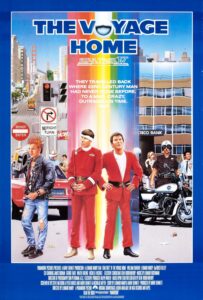 And the other is a smile.
And the other is a smile.
KIRK: Mister Sulu, you have the con. I’m gonna take our guest down and have a look at her whales. Oh, Mister Spock! Have you accounted for the variable mass of whales and water in your time re-entry programme?
SPOCK: Mister Scott cannot give me exact figures, Admiral. …So I will make a guess.
KIRK: A guess? You, Spock? That’s extraordinary!****
SPOCK: I don’t think he understands.
McCOY: No, Spock. He means that he feels safer about your ‘guesses’ than most other people’s facts.
SPOCK: Then you’re saying …it is a compliment.
McCOY: It is.
SPOCK: Ah, then I will try to make the best guess I can.
The **** asterisks in the above script is where Kirk finally gets his best friend back. While Spock isn’t yet calling him “Jim,” the evolution of Spock and his emotional education turns at this point and Kirk is ecstatic. The smile after “extraordinary” is everything.
So with the Genesis trilogy completed, we’re off on the next adventure of Star Trek in Star Trek V. Is it another direct sequel? At this point it doesn’t have to be. But from the spoilers of undertaking this voyage through Star Trek, I know there are only two films that remain with the original cast, so another trilogy isn’t in the cards. However, with The Voyage Home hitting a similar vibe to Search for Spock, having found the theatrical heart that made the television series so enjoyable, I’m ready for “The Final Frontier.”